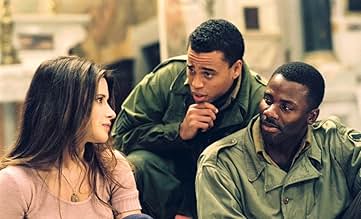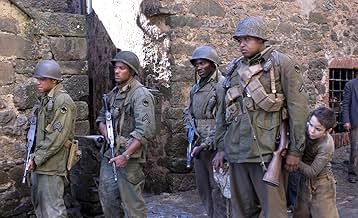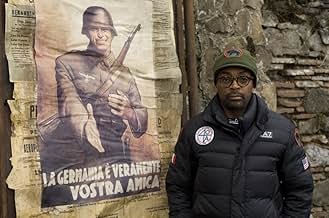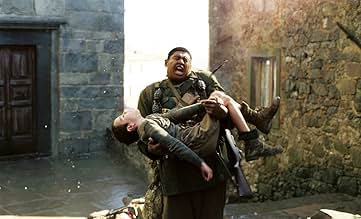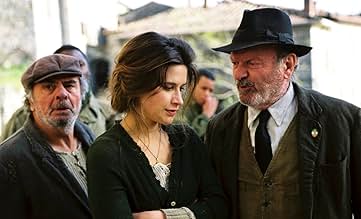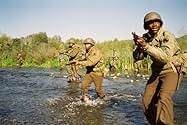AVALIAÇÃO DA IMDb
6,1/10
19 mil
SUA AVALIAÇÃO
Adicionar um enredo no seu idiomaSet in 1944 Italy, the story of four black American soldiers who get trapped in a Tuscan village during WWII.Set in 1944 Italy, the story of four black American soldiers who get trapped in a Tuscan village during WWII.Set in 1944 Italy, the story of four black American soldiers who get trapped in a Tuscan village during WWII.
- Prêmios
- 1 vitória e 10 indicações no total
Lidia Biondi
- Natalina
- (as Lydia Biondi)
Avaliações em destaque
I don't know why everyone here keeps telling that this movie is bad, because it's definitely rather good. Only thing to take out of plot was mas execution of civilians which I couldn't take and just pressed "skip the scene". From the very beginning, where troops advancing to enemy lines got under artillery and machine-gun fire dialogs are interesting and realistic, let alone so called hook from first minutes where black postman kills his customer for no apparent reason. It cost $45M to produce and true that commercially it has become a screw up but not everything revolves around money. I say it has no major faults in plot, definitely no more than any other picture does. And that story with Italian girl - Renata was her name, all is fair in love and war. Definitely worth seeing. Comparison to Save Private Ryan is not applicable.
MIRACLE AT ST. ANNA got panned pretty severely. And I can see why. Lacking cohesion and hopscotching around like a child with A-D-D, the story is tough to follow. And what about the title? Exactly what is "the Miracle"? Some might say it's that this film ever got made. But there are some upsides to it that I think make this a semi-watchable flick.
The first plus is that it focuses on a little known regiment of black WW II fighters called "The Buffalo Soldiers." Spike Lee had apparently been aching to do another "black story" and found his muse in Nazi occupied Italy.
Although there's been some bashing related to overacting on the main characters' parts, I didn't find that to be the case. Derek Luke, Michael Ealy, and the rest of these band of brothers did fine in my eyes. Although Spike did have them doing things that weren't being done during this time (specifically the "high five" which wasn't realized until the late 70s), I did find their delivery of the story to be engaging enough, and kept me watching during its entire, lengthy, 2 hours and 40 minute run time.
I also really liked the on-site filming locations in Italy, which gave the entire production a very real quality. The cobbled streets, twisted landscape, and ancient-looking buildings were all well-shown in the film and had me ogling at various times.
But, as they say, all good things must come to an end. Although Spike Lee tries admirably to keep the story together, he too often wanders off on tangents that have nothing to do with the story. One particularly infuriating scene involves John Leguizamo (THE HAPPENING). He's in modern day Italy with his lover and his only use for being in the film is that he throws a newspaper out a window so that it lands on a man's table. Why couldn't the man have simply seen it at a newsstand? Why the whole set up with Leguizamo and the hot chick? Sex for the sake of sex, perhaps? The other, less infuriating, item that shows Spike wandering away was when he films the Buffalo boys being refused food service at a place back in the States before they were shipped overseas. Why this played a role in the film and what it had to do with the Miracle is anyone's guess.
Finally, there's the tough sell of the Miracle itself. Although people can debate what qualifies as a miracle, I think most would say it equates to something supernatural that cannot be explained by normal evidence. And here lies perhaps the biggest problem for Miracle at St. Anna. There really isn't a miracle. Perhaps it's well enough that one of the Buffalo men made it home and found his way to peace. Perhaps it's that the world spun and allowed the last surviving Buffalo Soldier to avenge the people of St. Anna and his fallen brothers. Perhaps ...but not likely.
The first plus is that it focuses on a little known regiment of black WW II fighters called "The Buffalo Soldiers." Spike Lee had apparently been aching to do another "black story" and found his muse in Nazi occupied Italy.
Although there's been some bashing related to overacting on the main characters' parts, I didn't find that to be the case. Derek Luke, Michael Ealy, and the rest of these band of brothers did fine in my eyes. Although Spike did have them doing things that weren't being done during this time (specifically the "high five" which wasn't realized until the late 70s), I did find their delivery of the story to be engaging enough, and kept me watching during its entire, lengthy, 2 hours and 40 minute run time.
I also really liked the on-site filming locations in Italy, which gave the entire production a very real quality. The cobbled streets, twisted landscape, and ancient-looking buildings were all well-shown in the film and had me ogling at various times.
But, as they say, all good things must come to an end. Although Spike Lee tries admirably to keep the story together, he too often wanders off on tangents that have nothing to do with the story. One particularly infuriating scene involves John Leguizamo (THE HAPPENING). He's in modern day Italy with his lover and his only use for being in the film is that he throws a newspaper out a window so that it lands on a man's table. Why couldn't the man have simply seen it at a newsstand? Why the whole set up with Leguizamo and the hot chick? Sex for the sake of sex, perhaps? The other, less infuriating, item that shows Spike wandering away was when he films the Buffalo boys being refused food service at a place back in the States before they were shipped overseas. Why this played a role in the film and what it had to do with the Miracle is anyone's guess.
Finally, there's the tough sell of the Miracle itself. Although people can debate what qualifies as a miracle, I think most would say it equates to something supernatural that cannot be explained by normal evidence. And here lies perhaps the biggest problem for Miracle at St. Anna. There really isn't a miracle. Perhaps it's well enough that one of the Buffalo men made it home and found his way to peace. Perhaps it's that the world spun and allowed the last surviving Buffalo Soldier to avenge the people of St. Anna and his fallen brothers. Perhaps ...but not likely.
"Miracle at St. Anna" brings up a very interesting point about black soldiers during World War 2, primarily that they were actually there. Sure, Spike Lee wrongly and probably strategically went after Clint Eastwood for not depicting as many black soldiers at Iwo Jima in his two films, but that whole controversy led me to discover things I had not originally thought of about segregated units. And isn't encouraging people to think about race exactly what Spike is all about? Now he's directing "St. Anna" from a screenplay from James McBride (who also wrote the novel), the first movie I recall that focuses on an all black unit during the war. I love hearing stories about a director who puts his actors through a grueling, depressingly miserable boot camp before filming. I think it shows a lot of heart from everybody involved. It also sounds like it worked to their benefit. Advanced word has it that this movie is masterful and destined for some award recognition and after "Inside Man", Lee is already flying high. But you always wonder with Spike. Are you going to get a provocative flick like "The 25th Hour" or are you going to get something long and rambling that doesn't really go anywhere like "She Hate Me?" So can this movie get the audience and the awards, or will it fail on both accounts?
Spike Lee's film has gone from powerful Oscar contender to merciless dud in the course of 2 short days. There is nearly nothing to latch on to in this movie and yet it's jammed full of three hours worth of random material. The bloody battles are there, complete with bullets and explosions flying through the air and limbs being torn from bodies. The racism and bigotry of white America towards black America is alive and well, including one scene where a diner serves German soldiers but refuses to serve coloreds. We get many side characters including a German traitor and a group of Italian revolutionaries. There's a cute sub-plot about the relationship between Private Sam Train and an Italian boy and another subplot where a love triangle arises between Bishop, Stamps, and Renata. And then there is the folklore stuff about "The Sleeping Man." But what's the point of all this? I started thinking about the significance of saving one man or the significance of one picture defining an entire war and how those films by Spielberg and Eastwood (you know which ones I'm talking about) managed to engage us and then I started thinking about this film. Out of all that's happening in Italy, what exactly is it that we're supposed to hold on to here. What makes these soldiers and their story special other than them being black? It all just feels like melodramatic filler to me.
It also doesn't help that the characters seem like types instead of real personalities. Most don't come through as memorable or terribly compelling and you really have to blame the script for giving them such bland characterizations. There's the guy that Derek Luke plays, filled with honor even though he knows America still will not accept him. The guy Michael Ealy plays, a suave but selfish ladies man. And the wide-eyed innocent giant that Omar Benson Miller plays. These actors do what they can with one-dimensional roles but the characters and scenes they're given never allow them to show any range past the very short character descriptions they're given. Laz Alonso is really the only one out of the four who gets to show any real emotional depth, and that's only because of the beginning and ending of the film take place in 1984 and there seems to be a much more exciting and rich opportunity for drama in those few scenes than in any of the two hours spent in the Italian countryside.
And another thing I wondered about this movie was whether it was really trying to be a true to life account of heroism during the war or if it was some kind of over-produced WW2 action film. There were times when I really thought Lee was making a war film reminiscent of "Indiana Jones." One scene that keeps nagging at me is the introduction of a Nazi general, complete with over-the-top ominous score to announce him by composer Terence Blanchard. As the movie gets more soap operatic with betrayals and hidden secrets, this only made that feeling grow more and more. I also didn't care for the movie trying to be funny at certain points, feeling that those moments disrupted the tone entirely.
"Miracle at St. Anna" disappointed me tremendously. I was expecting something along the lines of "Glory" but what I got was something overblown with material and execution but still so short on actual depth or emotional impact. It's not all Spikes fault. A lot of it also has to be laid at the feet of screenwriter James McBride, who really should have showed some restraint when it came to adapting his novel cause 3 hours of this is too much. When you're going to make something that long, it's got to be air-tight (ex. "The Dark Knight) but unfortunately this movie just doesn't hold together at all. So if you're keeping score. Get the red marker out, cross this off your awards list cause its done.
Spike Lee's film has gone from powerful Oscar contender to merciless dud in the course of 2 short days. There is nearly nothing to latch on to in this movie and yet it's jammed full of three hours worth of random material. The bloody battles are there, complete with bullets and explosions flying through the air and limbs being torn from bodies. The racism and bigotry of white America towards black America is alive and well, including one scene where a diner serves German soldiers but refuses to serve coloreds. We get many side characters including a German traitor and a group of Italian revolutionaries. There's a cute sub-plot about the relationship between Private Sam Train and an Italian boy and another subplot where a love triangle arises between Bishop, Stamps, and Renata. And then there is the folklore stuff about "The Sleeping Man." But what's the point of all this? I started thinking about the significance of saving one man or the significance of one picture defining an entire war and how those films by Spielberg and Eastwood (you know which ones I'm talking about) managed to engage us and then I started thinking about this film. Out of all that's happening in Italy, what exactly is it that we're supposed to hold on to here. What makes these soldiers and their story special other than them being black? It all just feels like melodramatic filler to me.
It also doesn't help that the characters seem like types instead of real personalities. Most don't come through as memorable or terribly compelling and you really have to blame the script for giving them such bland characterizations. There's the guy that Derek Luke plays, filled with honor even though he knows America still will not accept him. The guy Michael Ealy plays, a suave but selfish ladies man. And the wide-eyed innocent giant that Omar Benson Miller plays. These actors do what they can with one-dimensional roles but the characters and scenes they're given never allow them to show any range past the very short character descriptions they're given. Laz Alonso is really the only one out of the four who gets to show any real emotional depth, and that's only because of the beginning and ending of the film take place in 1984 and there seems to be a much more exciting and rich opportunity for drama in those few scenes than in any of the two hours spent in the Italian countryside.
And another thing I wondered about this movie was whether it was really trying to be a true to life account of heroism during the war or if it was some kind of over-produced WW2 action film. There were times when I really thought Lee was making a war film reminiscent of "Indiana Jones." One scene that keeps nagging at me is the introduction of a Nazi general, complete with over-the-top ominous score to announce him by composer Terence Blanchard. As the movie gets more soap operatic with betrayals and hidden secrets, this only made that feeling grow more and more. I also didn't care for the movie trying to be funny at certain points, feeling that those moments disrupted the tone entirely.
"Miracle at St. Anna" disappointed me tremendously. I was expecting something along the lines of "Glory" but what I got was something overblown with material and execution but still so short on actual depth or emotional impact. It's not all Spikes fault. A lot of it also has to be laid at the feet of screenwriter James McBride, who really should have showed some restraint when it came to adapting his novel cause 3 hours of this is too much. When you're going to make something that long, it's got to be air-tight (ex. "The Dark Knight) but unfortunately this movie just doesn't hold together at all. So if you're keeping score. Get the red marker out, cross this off your awards list cause its done.
Sometimes a true-blue filmmaker, full of art-filled aspirations and good intentions, isn't always the best judge of what will ultimately really work for the story. This has happened to Spike Lee on more than one occasion- this taking aside the fact that he has consistently puffed-up many of his films lenght-wise- and in Miracle at St. Anna he makes an admirable, powerful stumble. It's not embarrassing like Bamboozled or just laughable like She Hate Me; he has a goal here, and it's worth trying out. The message is made right in the first scene: John Wayne war movies are propagandistic drek that show really only one side. Spike Lee's 'version' of black soldiers embedded in a Tuscan village in WW2 is meant to be an antidote to all of those pompous, (practically) white-only war pictures. The problem is that he hasn't done much to advance the genre, or break out of anything really interesting with the bulk of the characters.
Ironic then that Lee should criticize Clint Eastwood's Flags of Our Fathers since both films suffer from similar faults: they're too long, too convoluted, occasionally far too schmaltzy, and whether by partnership (being co-produced by Spielberg himself) or just ripping-off, Saving Private Ryan is evoked more than once in the battle scenes. In the case of Lee's film, he also isn't entirely sure always how he wants to ground the picture: is it about the black soldiers on their quagmire of sorts, or about the little boy who nicknames the big friendly black soldier "Chocolate Giant", or about Partisans and their daring-do and corruption alongside the Nazi's? Or is it about believing in frigging miracles? Lee wants it to be about all of these things, and has made the running time of 160+ minutes so that he can fit as much as possible with pretty much anything and everything from James McBride's book packed in (this even includes anachronisms, like a German officer referring to the Geneva conventions!)
And while it is easy to criticize Lee for putting in so much, and overcrowding the mid-section of his picture (and eventually coming to some real head-scratching, groan-inducing bits towards the very end), there is passionate film-making on display. There are chunks that are compelling, that do convey the blatant racism that was pervasive at the time for anyone with dark skin color (albeit Lee stuffs in next to no white people who aren't dumb bigots), and the as-a-given brutality of the Nazi war machine. There's one particular scene, I should note where an entire town is massacred, that delivers the devastating effect Lee wants, and there are a couple others like it that deliver the visceral reaction intended with modern war pictures.
For all of its faults, for all of its hackneyed acting- including one guy who seems like a WW2 version of the Alpa Chino character from Tropic Thunder complete with gold tooth- and bits involving a precocious kid communicating by tapping, and for its mind-boggling plot twists, it is often well-directed and conscious of its message. It's a disappointment, to be certain, but there's worse. 5.5/10
Ironic then that Lee should criticize Clint Eastwood's Flags of Our Fathers since both films suffer from similar faults: they're too long, too convoluted, occasionally far too schmaltzy, and whether by partnership (being co-produced by Spielberg himself) or just ripping-off, Saving Private Ryan is evoked more than once in the battle scenes. In the case of Lee's film, he also isn't entirely sure always how he wants to ground the picture: is it about the black soldiers on their quagmire of sorts, or about the little boy who nicknames the big friendly black soldier "Chocolate Giant", or about Partisans and their daring-do and corruption alongside the Nazi's? Or is it about believing in frigging miracles? Lee wants it to be about all of these things, and has made the running time of 160+ minutes so that he can fit as much as possible with pretty much anything and everything from James McBride's book packed in (this even includes anachronisms, like a German officer referring to the Geneva conventions!)
And while it is easy to criticize Lee for putting in so much, and overcrowding the mid-section of his picture (and eventually coming to some real head-scratching, groan-inducing bits towards the very end), there is passionate film-making on display. There are chunks that are compelling, that do convey the blatant racism that was pervasive at the time for anyone with dark skin color (albeit Lee stuffs in next to no white people who aren't dumb bigots), and the as-a-given brutality of the Nazi war machine. There's one particular scene, I should note where an entire town is massacred, that delivers the devastating effect Lee wants, and there are a couple others like it that deliver the visceral reaction intended with modern war pictures.
For all of its faults, for all of its hackneyed acting- including one guy who seems like a WW2 version of the Alpa Chino character from Tropic Thunder complete with gold tooth- and bits involving a precocious kid communicating by tapping, and for its mind-boggling plot twists, it is often well-directed and conscious of its message. It's a disappointment, to be certain, but there's worse. 5.5/10
As a black man who fully believes in black pride and progress, I must say I am truly disappointed with spike lee's new movie right now. I don't know where to begin in regards to expressing my disappointment but I will try. Considering how spike tries to come off as being very afro-centric, his portrayal of black characters was very insulting. There were so many typical blacks in film stereotypes in the movie that I just shook my head most of the time. For instance you had a black man with a gold tooth and stocking cap on, another that was enormous in size but brainless and country, and then to put the cherry on top the 2 guys are fighting over a white woman they met like 2 days ago and kept drooling over. Contrary to popular belief most of the white American soldiers didn't look like the actors in the movies made in the 50's and 60's. The actors looks were ploy to just associate good looks and chivalry with American soldiers in order to build moral for soldiers when they left and came home and to keep ppl interested in the movie. Another thing that really bothered me was that black films don't always need to be funny or trying to evoke laughter. This movie was suppose to be dramatic touching upon a serious subject and should have been directed in the same manner. Then the scoring of the movie was horrible. Even the little parts where he tries to show difference between African Americans and black puerto ricans was off and unnecessary. During that time those hispanics that were black or mulatto didn't try to act like there was a difference between the 2 other than language and maybe certain foods because they faced the same discriminations in PR, DR, and CUBA as in the US. These are just some of the issues I had with this movie. I think antoine faqua, who did training day and arthur, should have done this movie. I am just waiting now to see the mockery of hannibal that vin diesel does.
Você sabia?
- CuriosidadesSamuel L. Jackson turned down the offer to play as Corporal Hector Negron to work on O Vizinho (2008).
- Erros de gravaçãoWhen the professor examines the marble head he recognizes it as the "Primavera" from Santa Trinità in Florence. He assumes it is by Bartolomeo Ammannati, but the bridge is by Ammannati; the sculpture is by Pietro Francavilla.
- Citações
Livingston: Safety is the greatest risk of all, because safety leaves no room for miracles and miracles are the only sure thing in life.
- Trilhas sonorasFaccetta Nera
Written by Gustavo Cacini (as Cascini) / Giuseppe Micheli (as Micheli) / Vincenzo Raimondi / Arnaldo Stazzonelli (as Stazzonelli)
Edizioni Bixio C.E.M.S.A.
Principais escolhas
Faça login para avaliar e ver a lista de recomendações personalizadas
Detalhes
- Data de lançamento
- Países de origem
- Central de atendimento oficial
- Idiomas
- Também conhecido como
- Miracle at St. Anna
- Locações de filme
- Empresas de produção
- Consulte mais créditos da empresa na IMDbPro
Bilheteria
- Orçamento
- US$ 45.000.000 (estimativa)
- Faturamento bruto nos EUA e Canadá
- US$ 7.919.117
- Fim de semana de estreia nos EUA e Canadá
- US$ 3.477.996
- 28 de set. de 2008
- Faturamento bruto mundial
- US$ 9.333.654
- Tempo de duração2 horas 40 minutos
- Cor
- Mixagem de som
- Proporção
- 2.39 : 1
Contribua para esta página
Sugerir uma alteração ou adicionar conteúdo ausente

Principal brecha
By what name was Milagre em Sta. Anna (2008) officially released in India in English?
Responda






